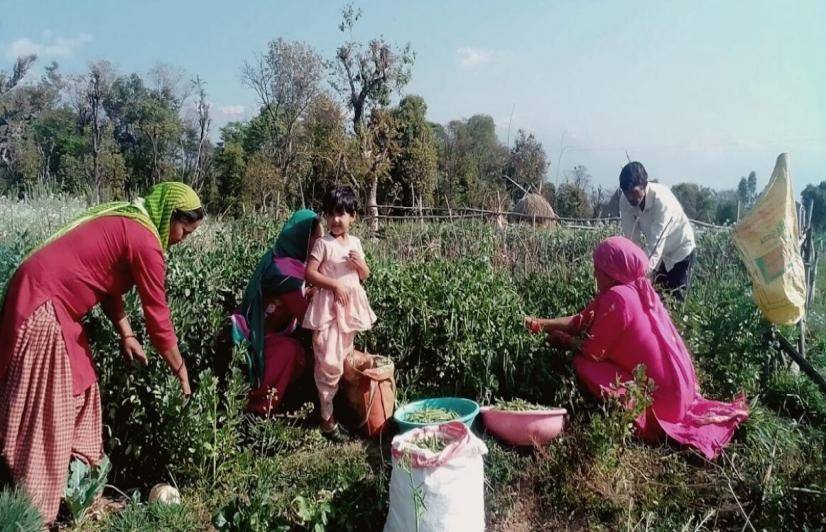In fact, people from other development blocks, where there are no such water channels, are moving away from cultivation to embrace other forms of livelihood because of lack of irrigation facilities…writes Rohit Prashar
“Kuhls are the lifeline for us farmers. Our livelihood is entirely dependent on them. We’ve cherished them for generations and passed them on to our children as a legacy,” said Kulwant Singh, a farmer from Kangra district in Himachal Pradesh.
Kuhls are a traditional system of irrigation usually maintained by the local community. They resemble small canals that carry water from a larger water body to the fields. Made usually of cement now, these channels transport water from the main kuhl to the villages and fields through smaller drains. Pucca or kachcha gates are constructed at intervals along their length to regulate the water flow. These gates are usually opened and closed on a predetermined schedule.
A vital part of the regional economy, the Tikhrul Kuhl here has been maintained by farmers from more than 150 villages for over a century. These are agriculturists from 12 panchayats in the Panchrukhi block of Kangra, the largest district of Himachal Pradesh. Running up to a length of 25km till Simbalkhola village, the canal has been irrigating about 10,000ha of land for over a 100 years.
Situated in the lap of the snow-capped Dhauladhars, Kangra district practised rain-fed farming till about 300 years ago, when the Katoch kings of the Trigarta kingdom introduced the kuhl system for irrigation and appointed a Kohli, a person responsible for the upkeep of kuhls. Thanks to the ready availability of water, the farming community of the region has been thriving economically. They can grow vegetables along with the traditional seasonal paddy and wheat cultivation.
Benefits galore
Kulwant Raj, a member of the Tikhrul Kuhl Management Committee, pointed out that with water from the kuhl, he grows seasonal vegetables that enables him to sustain his family. He said the villagers worked together to repair the kuhl every year to ensure that water was available for farming all through the year.
Vijay Lakshmi, a farmer from Simbalkhola panchayat, said this kuhl had earned her national recognition. Lakshmi had produced a record 41 quintal of high-quality wheat from 1ha of land, for which she was awarded the Krishi Karman Puraskar by the Union Minister for Agriculture.
However, the areas that do not benefit from kuhl irrigation present a very different picture. In fact, people from other development blocks, where there are no such water channels, are moving away from cultivation to embrace other forms of livelihood because of lack of irrigation facilities.
“Farming in our area is completely rain-fed. So we are able to cultivate mainly wheat and maize here,” said Rajendra Kumar, a farmer from Lambagaon, another block in Kangra. “We do not have a channel for water, so most young people prefer to move to other professions.”
On being asked whether they ever thought of implementing a similar irrigation plan, he said, “The channels have only been constructed in places where there’s a regular source of water. There’s no river or nullah anywhere near these areas, due to which no kuhls have been constructed here.
Similarly, Renu Kumari, a woman farmer from Pragpur block, also pointed out that they had ample cultivable land but no irrigation system in place, due to which they are unable to grow vegetables alongside traditional crops.
Upkeep and maintenance
Tikhrul Kuhl is 25km long and irrigates more than 10,000ha of land belonging to 8,000 farmers of Panchrukhi block. Water is transported from Aba Khad (ravine) near Banuri to a distance of 25km, covering more than 150 villages. As much as 80 per cent of this canal is concrete, while 5km is still kachcha.
The 12 panchayats of Kangra formed a 20-member committee to oversee the upkeep of Tikhrul kuhl. The committee meets every year to decide on the specifics of water distribution to its villages. The kohli, who’s responsible for the maintenance of the channel, and a representative of each village, then disseminates this information, after which every villager is bound to uphold the decision.
Moreover, one person from the village is present when the water is being released to their village, and to ensure that no damage is inflicted on the irrigation channel, the committee has laid down several rules. Anyone caught flouting them is fined Rs 500.
Devendra Kumar, the pradhan of Simbalkhola, said the panchayat and Jal Shakti Department draw up a budget to repair the kuhls. Delar Chand, who’s been looking after Tikhrul Kuhl for the past 22 years, said, “This kuhl is more than 100 years old, and we repair it every year. Before me, my father was responsible for it for 32 years.”
Sonika Gupta, block technology manager of the agriculture department in Panchrukhi, said the farmers here had preserved this old irrigation facility, which puts them at an advantage while cultivating crops like seasonal vegetables.
Furthermore, project director of Kangra in the department, Dr Shashi Pal Attri said that in many areas of the district, farmers had come together to protect the channels, which in turn made them prosperous. The government also makes a budget provision from time to time for the maintenance of these channels, which has assured the smooth functioning of the kuhls.
